Choosing between Shopify Advanced and Shopify Plus can be challenging, especially for businesses looking to scale. Both plans cater to high-volume sellers but come with different features, pricing, and levels of customization.
Shopify Advanced is ideal for growing businesses that need more control, while Shopify Plus is tailored for enterprises requiring advanced automation, multi-store management, and dedicated support.
In this guide, I’ll compare Shopify Advanced vs. Shopify Plus, breaking down their key differences to help you determine which plan best fits your business needs.
Let’s dive in!
Shopify Advanced vs Plus (2025): A Quick Comparison
Before we dig deeper into the specifics, here’s a quick overview of how these two plans stack up against each other:
| Feature | Shopify Advanced | Shopify Plus |
|---|---|---|
| Monthly Price | £344/month (£259 annually) | Starting at $2,300/month |
| Staff Accounts | Up to 15 | Unlimited |
| Inventory Locations | Up to 10 | Up to 200 |
| Transaction Fees | 0.6% (third-party payment) | 0.2% (third-party payment) |
| API Call Limit | 2X on Select APIs | 10X on Select APIs |
| Headless Storefronts | 1 store | 25 stores |
| B2B Features | Basic | Advanced |
| Customization | Limited | Advanced |
| Dedicated Support | Standard support | Dedicated account manager |
| Exclusive Apps | No | Yes |
What Is Shopify Advanced?
Shopify Advanced is the highest tier among Shopify’s standard plans. It offers enhanced features for growing businesses that need more control over their online stores. This plan includes advanced reporting capabilities, lower credit card rates, and third-party calculated shipping rates. It’s perfect for businesses that have outgrown the basic Shopify plan but don’t need enterprise-level features.
Who Is Shopify Advanced For?
Shopify Advanced caters to:
- Mid-sized businesses with growing sales volumes
- Companies with multiple staff members needing store access
- Merchants requiring detailed analytics and reporting
- Businesses expanding into international markets
- Stores processing 500-1000 orders per day
What Is Shopify Plus?
Shopify Plus is an enterprise-level ecommerce solution designed for high-volume merchants and large businesses. Most of the Shopify B2B businesses use Shopify Plus for managing complex and high-volume business operations.
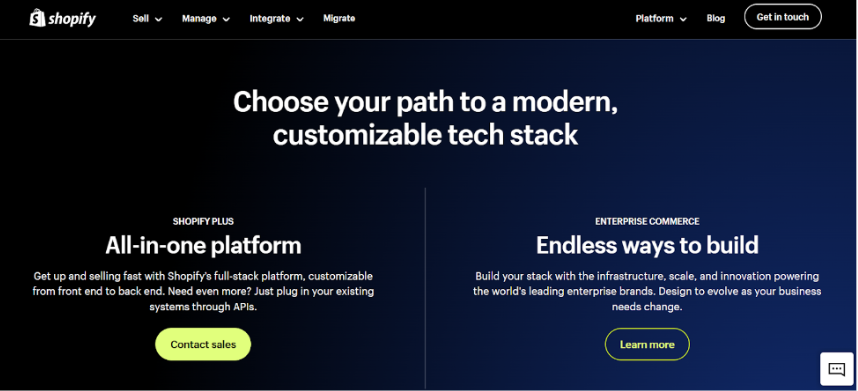
It provides extensive customization options, automation tools, and dedicated support. The platform handles complex operations and multiple stores and offers exclusive features not available in other Shopify plans.
Who Is Shopify Plus For?
Shopify Plus is ideal for:
- Enterprise-level businesses
- Companies with multiple brands or stores
- High-volume merchants (1000+ orders daily)
- International businesses needing multiple storefronts
- B2B companies requiring wholesale capabilities
- Brands needing advanced automation and customization
Also, check the Shopify vs Shopify Plus comparison for a better understanding of the Plus plan against regular plans.
Shopify Advanced vs Plus: Pricing Comparison
The pricing structure marks one of the biggest differences between these two plans. Let’s break down the costs and what you get for your money.
Shopify Advanced Pricing
Shopify Advanced costs £344 per month with a month-to-month subscription. If you opt for annual billing, the price drops to £259 per month, saving you £1020 per year.
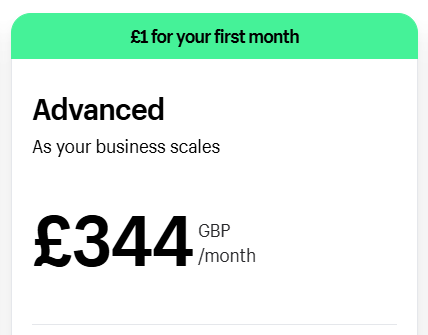
The plan includes:
- Up to 15 staff accounts
- Advanced reporting features
- Third-party calculated shipping rates
- Lower credit card rates (2.5% + 30¢)
- International pricing tools
- Up to 10 inventory locations
New users get a 3-day free trial, followed by a 90-day trial for just £1/month on Shopify standard plans. This trial period helps you test all features before committing to the full subscription price.
Shopify Plus Pricing
Shopify Plus requires an annual commitment, with pricing starting at $2,300 per month for a one-year term. The price can drop to $2,000 per month with a three-year commitment. However, final pricing depends on your business volume and specific needs.
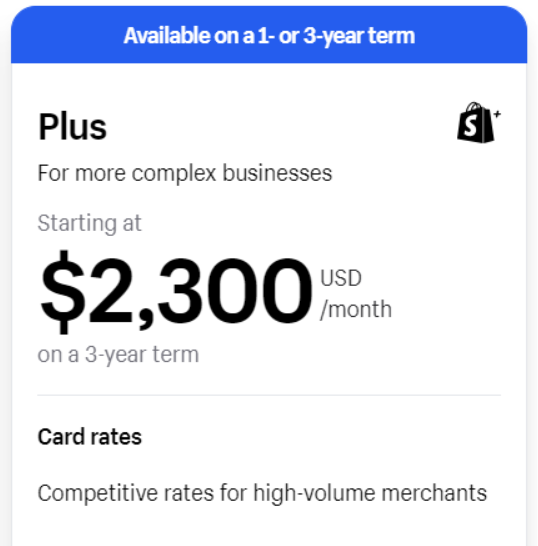
The plan includes:
- Unlimited staff accounts
- Dedicated account manager
- Advanced automation tools
- Multiple store management
- B2B/wholesale features
- Custom checkout options
- Up to 200 inventory locations
- Exclusive apps and tools
Unlike Shopify Advanced, Shopify Plus doesn’t offer a free trial period. You’ll need to contact Shopify’s sales team to discuss your needs and get a custom quote.
Shopify Advanced vs Plus: Similar Feature Comparison
While both plans share many core features, their implementation and capabilities differ significantly. Let’s examine how these shared features compare across both plans.
Checkout Customization
Your checkout process shapes the final step of the customer journey, making it crucial for conversions.
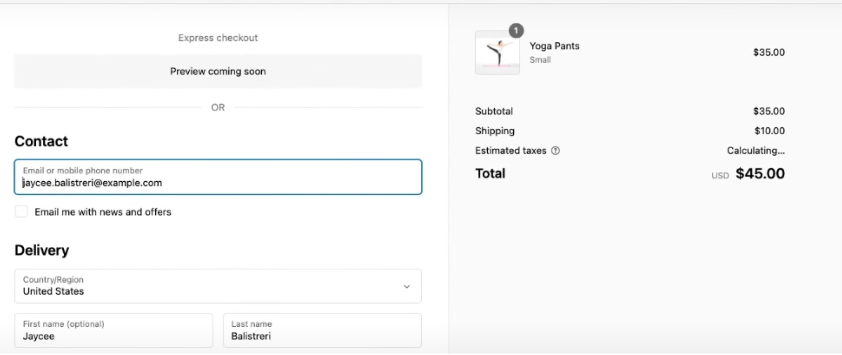
Shopify Advanced: The Advanced plan offers basic checkout customization options. You can add your logo, change colors, and make minor adjustments to match your brand. However, you can’t modify the checkout flow or add custom fields. The checkout process follows Shopify’s standard template, which works well for most businesses but may feel limiting for those needing more control.
Shopify Plus: Plus users get extensive checkout customization capabilities through Checkout Extensibility. You can create unique checkout experiences, add custom fields, modify the flow, and implement specialized features like gift-wrapping options or delivery instructions. Shopify Plus merchants can also use custom apps to enhance the checkout process and create personalized experiences based on customer data.
Verdict: Shopify Plus offers more control and flexibility for businesses needing a highly customizable checkout process.
Multi-Currency Selling
Expanding globally requires robust multi-currency capabilities to serve customers in different regions effectively.
Shopify Advanced: The Advanced plan supports selling in multiple currencies through Shopify Markets. You can display prices in local currencies and manage up to three international markets without additional costs. The platform automatically handles currency conversion based on current exchange rates. However, you’re limited in how you can customize pricing for different markets.
Shopify Plus: Plus takes international selling further by allowing the management of up to 25 separate stores, each targeting different regions.
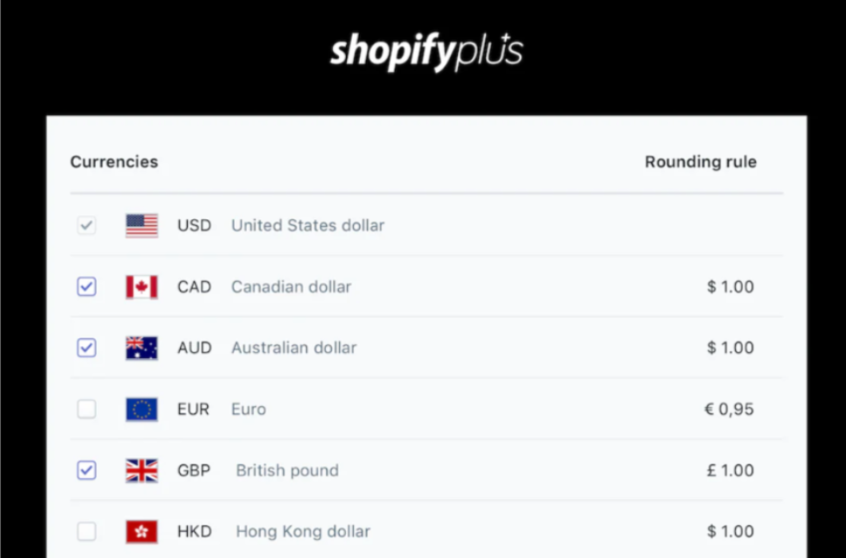
You get complete control over pricing in each market, can set market-specific discounts, and manage multiple payment providers. Plus users can also create region-specific inventory rules and shipping options.
Verdict: Shopify Plus provides a far more scalable solution for global businesses, offering deeper customization and flexibility.
Analytics And Reporting
Data-driven decisions require powerful analytics tools to understand your business performance and customer behavior.
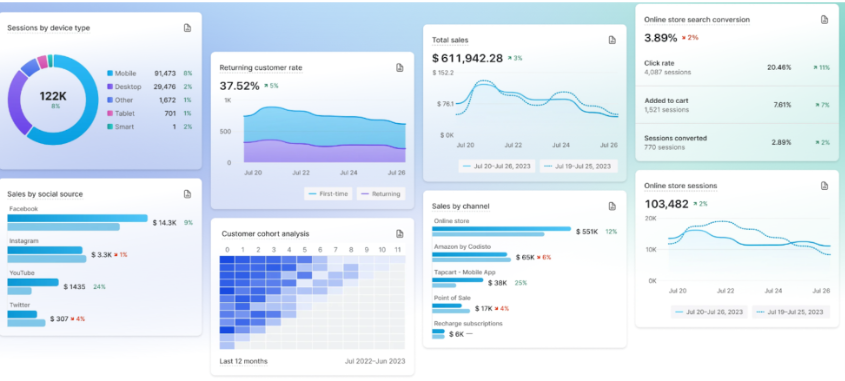
Shopify Advanced: Advanced offers comprehensive analytics tools, including custom report builders, inventory reports, and sales analysis. You can create and save up to 50 custom reports, track customer behavior, and monitor your store’s performance. The platform provides real-time data on sales, inventory, and customer activity.
Shopify Plus: Plus enhances reporting capabilities with advanced analytics tools and deeper insights. You get access to Shopify’s enterprise-level analytics, including detailed customer segmentation, predictive analytics, and advanced marketing reports. Plus users can also connect with third-party analytics platforms through expanded API access.
Verdict: Shopify Plus offers more advanced, detailed, and customizable reporting tools, ideal for large businesses.
API Access And Integration
Connecting your store with other business tools and services depends on reliable API access and integration capabilities.
Shopify Advanced: The Advanced plan provides advanced order API access with a limit of 4 requests per second. This allows integration with various third-party apps and services. You can connect your store with inventory management systems, marketing tools, and other business solutions. However, API rate limits might affect performance during high-traffic periods.
Shopify Plus: Plus users get higher API limits (10+ requests per second) and access to exclusive APIs.
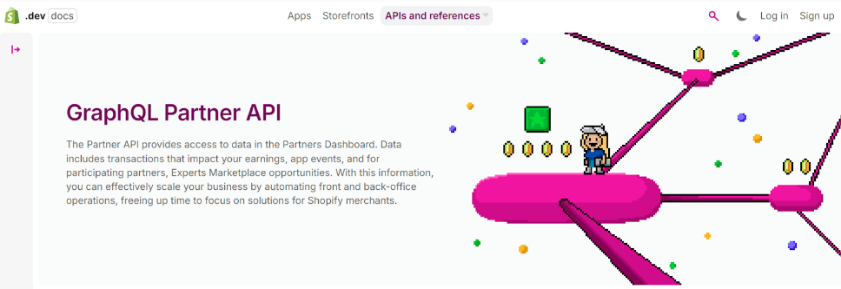
This enables more complex integrations, better performance during peak times, and the ability to build custom solutions. Plus merchants can also use Shopify’s GraphQL API for more efficient data queries.
Verdict: Shopify Plus delivers superior API capabilities, making it a better option for businesses with complex integration needs.
Staff Management
Growing teams need efficient ways to manage permissions and access across your e-commerce operations.
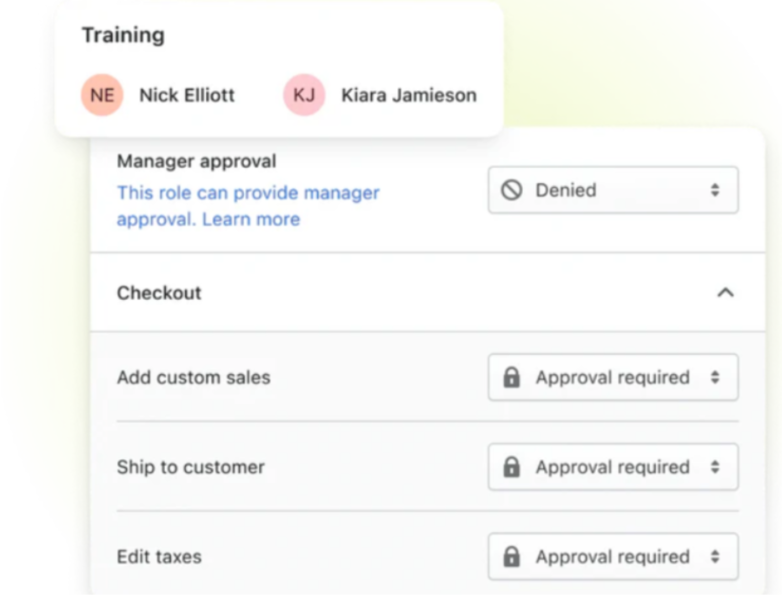
Shopify Advanced: You can add up to 15 staff accounts with different permission levels. This works well for medium-sized teams where roles are clearly defined. The platform allows staff members to manage their basic permissions and track their activities.
Shopify Plus: Plus offers unlimited staff accounts with advanced permission settings. You can create custom roles, set granular permissions, and manage teams across multiple stores. The platform also provides better tools for tracking staff activity and managing large teams.
Verdict: Shopify Plus is more suited for larger teams or businesses requiring advanced staff management capabilities.
Inventory Management
Tracking and managing your product inventory across multiple locations demands robust inventory tools.

Shopify Advanced: The Advanced plan supports up to 10 inventory locations. You can track stock levels, set reorder points, and manage transfers between locations. The platform provides basic inventory forecasting and automated low-stock alerts.
Shopify Plus: Plus expands inventory capabilities to 200 locations. You get advanced inventory management tools, including automated reordering, complex fulfillment rules, and detailed inventory analytics. Plus users can also create location-specific pricing and inventory policies.
Verdict: Shopify Plus provides superior inventory management, ideal for businesses with large-scale operations.
Marketing Tools
Effective marketing requires tools that help you reach customers and drive sales across multiple channels.
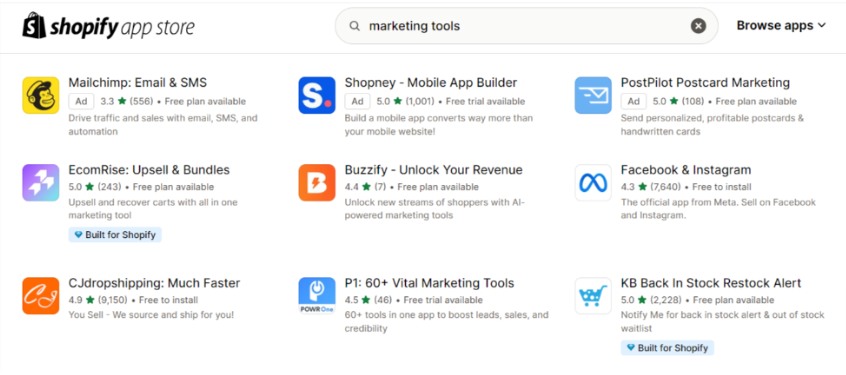
Shopify Advanced: Advanced includes essential marketing tools like email campaigns, discount codes, and abandoned cart recovery. You can create basic marketing automation and run promotional campaigns. The plan also supports integration with major marketing platforms.
Shopify Plus: Plus offers more sophisticated marketing capabilities through Shopify Flow and Launchpad. You can create complex automation workflows, schedule campaigns, and manage large-scale promotions. Plus users also get access to exclusive marketing and SEO apps and better integration options.
Verdict: Shopify Plus offers a more comprehensive suite of marketing tools, perfect for businesses looking to scale their marketing efforts.
When To Upgrade From Shopify Advanced To Shopify Plus?
Consider upgrading to Shopify Plus when:
- Your monthly revenue exceeds $800,000
- You need to manage multiple stores or brands
- Your business requires advanced B2B features
- You want extensive customization options
- Your team needs unlimited staff accounts
- You’re expanding internationally and need multiple storefronts
- Your current API limits are causing performance issues
- You require advanced automation capabilities
- Your business needs dedicated support
- You want access to enterprise-level tools and features
Conclusion: Shopify Plus Provides Advanced Features Beyond Shopify Advanced
Both Shopify Advanced and Plus offer robust e-commerce capabilities, but they serve different business needs. Shopify Advanced provides excellent features for growing businesses with its reasonable pricing and solid feature set. It’s perfect for companies that need more than basic features but aren’t ready for enterprise-level solutions.
Shopify Plus, while significantly more expensive, delivers enterprise-grade features, unlimited scalability, and dedicated support. It’s the right choice for large businesses, multi-brand companies, and high-volume merchants who need maximum flexibility and control.
Choose Shopify Advanced if you’re a growing business looking for advanced features without enterprise-level complexity. Opt for Shopify Plus if you need ultimate customization, manage multiple stores, or require enterprise-level support and features.
Remember, you can always start with Shopify Advanced and upgrade to Plus as your business grows. The key is matching your current needs and future growth plans with the right platform capabilities.
FAQs
Shopify Advanced is for growing businesses, while Shopify Plus is for large enterprises needing more customization, automation, and support.
Yes, you can upgrade anytime as your business grows.
Yes, Shopify Plus allows advanced checkout customization, while Shopify Advanced has basic options.
Shopify Plus is better because it supports multiple storefronts and advanced pricing control.
Shopify Advanced allows up to 15 staff accounts, while Shopify Plus offers unlimited accounts.

